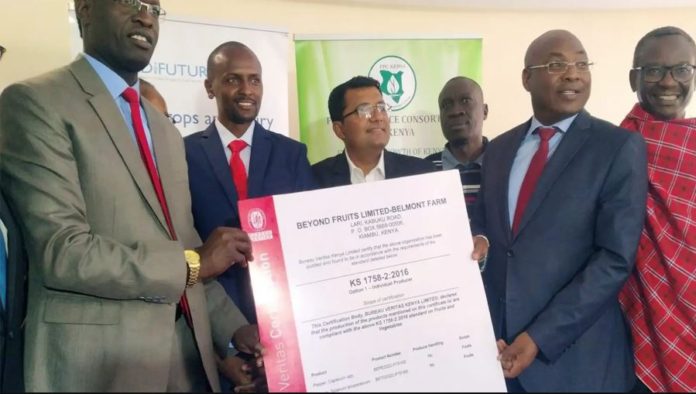Belmont Farm of Beyond Fruits Limited, a vegetable farm in Limuru, Kiambu County has become the first individual horticulture producer in Kenya to get a food safety standard certificate.
The farm was certified to the KS 1758-2:2016 standard. Kenya Standard 1758:2016 (KS 1758) is a code of practice for the horticulture industry in Kenya. In July 2021, the Ministry of Agriculture launched KS1758, a standard on food safety, social accountability and environmental management. It stipulates the hygienic and safety requirements during the production, handling and marketing of flowers and ornamentals, fruits, vegetables, herbs and spices.
Ordinarily, it is mandatory that fresh horticultural produce destined for the international export market meet globally recognised standards for food safety & traceability namely GlobalGap and other standards such as FSSC,BRC and IFS. This has not been a requirement for produce going to the local market.
Food safety standard
But thanks to an initiative by the Fresh Produce Consortium of Kenya (FPC) through the support of USAID RTI under the Kenya Crops and Dairy Market Systems (KCDMS), the county now has a food safety standard. George Hinga, farm manager at Belmount Farm said the standard will go a long way in ensuring that they are able to maximise their output.
“We could only sustain about three or four shops with our products mainly within Nairobi. Demand for safe and quality food amongst Kenyan consumers has increased. With the training, we have received on good agricultural practices, we want to increase our stores from the current 25 to 30-35 countrywide,” he said.
He said the certification has come in good time because the same has not been happening for those supplying the local market. Livestock Principal Secretary Harry Kimtai said the KS 1758 is the Country’s’ Code of Practice for scaling up compliance with quality and safety regulations for fresh produce.
“The standard is an all-around encompassing area of fresh produce namely plant health, food safety, environmental sustainability and worker health, safety and social accountability. The different industry stakeholders are tasked with the duty of creating awareness. However, other standards set out by different entities like Global GAP, EuroGAP, KenyaGAP and several quality and safety regulations need to be complied with,” he said.
The horticulture sub-sector is a major category within the sector, with 201 different types of crops, which accounts for 80 per cent of the total crop being grown in the country.








